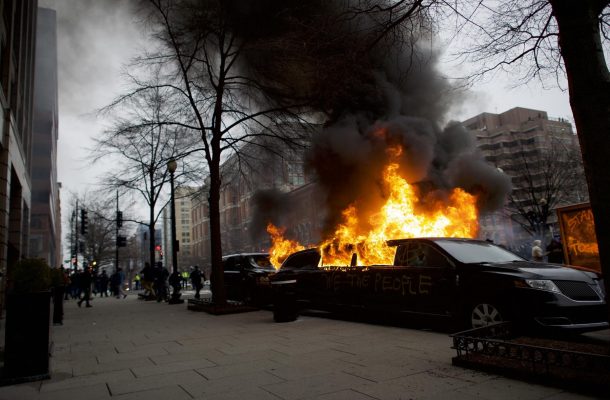A GFC 2.0 would remake the world in dangerous ways

If the current global stock market uncertainty doesn’t make you nervous then think again.
It may be comforting to listen to talk of temporary market corrections as stock prices fall, but the bigger question being asked by many market analysts and commentators isn’t if we are at risk of another Global Financial Crisis, but actually when the next crisis will happen.
Analysts who predicted the 2007-08 GFC are warning it could hit as early as 2020.
It’s extraordinary that in little more than a decade there are serious market predictions that the financial system is running headlong into a second cataclysm. But what is more extraordinary is that we are overlooking the profound political disruption that a GFC 2.0 could unleash.
Make no mistake, the next GFC won’t just be another financial dislocation on a seismic scale. It will be a paradigm-shifting political and social event that will remake the world in new – and potentially dangerous – ways.
Next Time Will Be Different
Global recessions and big share market corrections are of course as old as capitalism itself. But financial markets today are many times more super-scaled and super-sped than they were just ten years ago.
Moreover, few of the major financial reforms promised by politicians to avoid a repeat of 2008 have been put in place.
This is why many commentators agree that GFC 2.0 isn’t only inevitable, but will be bigger and more destructive in economic and financial terms than the first.
That’s saying something given the immediate impacts of the 2008 crash were greater than the 1929 Wall Street Crash, which triggered the economic and social devastation that was the Great Depression of the 1930s.
In the wake of the GFC, the balance sheets of nations like Greece and Iceland were shattered. Whole industries came to a standstill and tens of millions of jobs evaporated.The flow-on in terms of lost prosperity and opportunity was many times greater.
The key factor in 2008 that saved from the world from a Great Depression-type scenario was that governments quickly mobilised and globally co-ordinated huge financial resources to combat the crisis through bank and government bail-outs, economic stimulus packages and low interest rates.
However, today it is generally acknowledged that these same governments – having effectively spent much of their firepower saving the world from the first GFC – won’t have the same fiscal resources to do the same next time around.What is more, in an era of growing economic protectionism, governments won’t have the same willingness to co-operate.
A bigger question
So not only do we face the inevitability of another GFC occurring in a few short years, there is little that can or will be done to mitigate its dire economic and social impacts.
That is truly frightening.
The 2008 GFC sparked protest and debate across many countries about the legitimacy of free markets and their dominant role in ordering and organising the 21st century world.
There were calls for the liberal order to be overthrown – the Occupy Wall Street movement – and those parts of Europe that were worst hit by post-GFC austerity measures were hit by strikes and street riots. But the protests were largely short-lived.
Yet underneath the veneer of a return to ‘business-as-usual’ over the past 10 years, doubts over the current paradigm have become a persistent mainstream hum.
Wage stagnation and growing global inequality, combined with spiralling higher CEO pay and massive corporate tax dodges have all added to the tinder of discontent the first GFC initially accumulated around free markets.
The return of ‘dead’ paradigms
A growing belief that Western democratic systems are now indelibly hostage to big money and are failing, has further fuelled questioning of the current liberal paradigm.
All this points to why GFC 2.0 threatens to not only light a political fire under liberal markets and democracy, but to pour gasoline on it.
Not surprisingly as liberalism flounders, support for what were, two decades ago, supposedly dead paradigms are growing.
In that supposed bastion of free markets, the United States, socialism is now more popular than capitalism among large sections of young people. In Europe and elsewhere, quasi-fascism in the form of strongman politics is on the rise.
The picture is eerily similar to the crossroads the liberal order found itself at the time of the 1929 financial crash – when its legitimacy flatlined, and socialism and fascism were surging in popular acceptance.
Liberalism was saved largely by America and its then President Franklin D. Roosevelt.A ‘strongman’ in some ways, FDR was also subtle and perceptive enough to refashion the liberal order into a gentler, more inclusive free market system.
In the process, he and his pre-war New Deal for ordinary Americans restored public faith in democratic capitalism. FDR’s innovations in liberal governance provided both a beacon and inspiration for other Western nations to similarly remake their liberal systems in progressive ways.
Today we are at the opposite end of the spectrum.
Donald Trump may or may not win re-election in 2020. To a large extent it won’t matter.
His legacy of emboldening extremism, while distancing the US from the rest of the world, will mean the chances of America leading itself and the world through the next GFC – as it did in post the first – are remote.
We are then left with this possible scenario:The firestorm of financial mayhem set off by GFC 2.0 will grow out of control because governments don’t have the fiscal capacity to deal with it. As a result, the global financial crisis will transform into an intractable global economic crisis as unemployment and economic deprivation soar to unheard of levels.
In what becomes a state of permanent economic emergency, citizens across liberal democracies will demand drastic action and democracy itself will be suspended or significantly curtailed.
Looming Authoritarianism?
Free markets will be reined in not only through massive re-regulation, but through forced nationalisation of key industries such as banks and energy.
Digital media giants like Facebook and Google, among the world’s largest corporations, will likewise be deemed too big and exploitative and will broken up and nationalised.
The powers of these technology giants to track and surveil people’s private lives will be usurped and used by the state.
And so, our Orwellian future begins. Far-fetched? Maybe.
But if we acknowledge the GFC 2.0 is just around the corner, as most are now predicting, all bets are off for the world as we currently know it.
This article was published by Pursuit.
Mark Triffitt lectures in public policy and politics at the University of Melbourne. He was formerly Director of Strategic Communications with the Business Council of Australia and Executive General Manager of Corporate Affairs at Wesfarmers.















